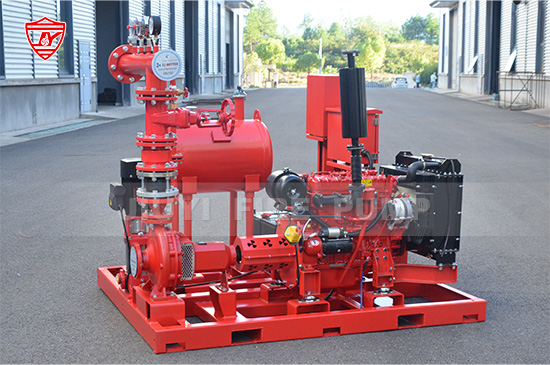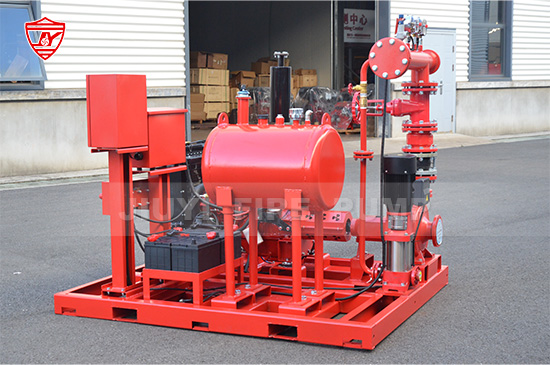Fire pumps are the heart of a building’s fire protection system, ensuring sufficient water pressure and flow during emergencies. However, selecting the right fire pump is not as simple as choosing one model for all applications. Each building type—residential, commercial, industrial, or high-rise—has unique requirements for fire water supply, system design, and operational conditions.
In this article, we will explain how to select the most suitable fire pump for different building types, according to performance needs, standards like NFPA 20, and installation conditions.

A fire pump increases the pressure of water in a fire protection system when the available water supply cannot meet the demand of sprinklers, standpipes, or hydrants. The performance of a fire pump directly determines whether a system can deliver sufficient water to extinguish or control a fire in its early stage.
The most commonly used fire pumps include:
Electric Fire Pump: Powered by an electric motor, ideal for stable power supply environments.
Diesel Engine Fire Pump: Driven by a diesel engine, used where electrical supply is unreliable or unavailable.
Vertical Turbine Fire Pump: Installed when the water source is underground, such as in wells or tanks.
Jockey Pump: A small pump that maintains system pressure and prevents the main fire pump from frequent starts.
Before choosing a fire pump, engineers must consider several technical and practical factors:
Water Supply Source
Determine whether the system uses a municipal supply, storage tank, or underground well. This affects the pump type—end suction, split case, or vertical turbine.
System Demand
Calculate the required flow (GPM or L/min) and pressure (PSI or bar) based on the fire protection design. Each building type has different system demands.
Power Availability
If electrical power is reliable, an electric pump is ideal. For locations with unstable or no electricity, diesel engine fire pumps are preferred.
Installation Environment
Consider available space, accessibility for maintenance, ventilation, and environmental conditions like humidity or temperature.
Compliance and Certification
Always ensure pumps meet standards such as NFPA 20, and where required, are UL listed and FM approved. This ensures performance reliability and global acceptance.
Type: Apartments, condominiums, and villas
Key Considerations:
Residential buildings generally have lower fire water demands compared to industrial or commercial sites. The goal is to ensure adequate pressure for sprinkler systems and hose reels without excessive capacity.
Recommended Fire Pumps:
End Suction Electric Fire Pump: Compact and cost-effective for low-to-medium-rise apartments with stable power.
Diesel Fire Pump: For areas with unreliable grid power or where backup is required by local code.
Jockey Pump: To maintain pressure between fire incidents and reduce the main pump’s workload.
Tip:
Prioritize energy-efficient electric pumps that can maintain steady flow at moderate pressures.
Type: Offices, shopping malls, hotels, hospitals, and schools
Key Considerations:
These facilities have larger water distribution networks and diverse fire protection systems. Pumps must provide steady pressure for both sprinklers and standpipe systems.
Recommended Fire Pumps:
Horizontal Split Case Fire Pump: High efficiency, easy maintenance, and durable—ideal for large commercial complexes.
Diesel Engine Fire Pump: Often required as a backup when business continuity and life safety are critical.
Vertical Inline Fire Pump: Space-saving option for mechanical rooms with limited space.
Tip:
Select a fire pump set that includes both main and standby pumps to comply with NFPA 20 redundancy requirements.
Type: Manufacturing plants, refineries, chemical warehouses, and factories
Key Considerations:
Industrial sites usually demand high-capacity fire pumps capable of handling large water volumes and harsh environments. Systems often integrate hydrant and foam suppression networks.
Recommended Fire Pumps:
Diesel Engine Fire Pump: Reliable in off-grid or hazardous environments where electric supply could be cut off during fire incidents.
Horizontal Split Case Pump: Preferred for high flow applications, offering stability and ease of maintenance.
Vertical Turbine Fire Pump: For sites using underground or open water sources, such as tanks, rivers, or reservoirs.
Tip:
Ensure materials of construction are corrosion-resistant, especially for chemical or marine facilities.
Type: Office towers, skyscrapers, and large residential complexes
Key Considerations:
High-rise structures require fire pumps capable of delivering high pressure to upper floors while maintaining consistent flow.
Recommended Fire Pumps:
Multi-Stage Vertical Turbine Pump: Provides high discharge pressure with stable performance.
Diesel Backup Pump: Ensures continuous operation in case of power failure.
Pressure Maintenance (Jockey) Pump: Essential for maintaining line pressure at all times.
Tip:
When selecting a pump for high-rise buildings, consider system zoning—separate pumps may be used for lower and upper zones to manage pressure efficiently.
Type: Storage facilities, logistics hubs, and distribution centers
Key Considerations:
Warehouses often store flammable materials and require high-capacity water supply for sprinklers and hydrants.
Recommended Fire Pumps:
Horizontal Split Case or End Suction Pump: Reliable and powerful for medium to large warehouses.
Diesel Fire Pump: Acts as a backup or primary driver in isolated areas.
Jockey Pump: Helps maintain constant pressure and readiness.
Tip:
For large storage facilities, consider a pump set with flow testing provisions to ensure system reliability.
Type: Airports, metro stations, stadiums, and government buildings
Key Considerations:
Such structures have complex fire protection networks and require highly dependable fire pump systems that can handle variable loads and quick startup.
Recommended Fire Pumps:
UL Listed Diesel Fire Pump Sets: For large-scale or mission-critical facilities.
Vertical Turbine Fire Pump: If the site draws water from underground tanks or open sources.
Combined Fire Pump Packages: Including controller, jockey pump, and accessories for easier system integration.
Tip:
Select pump systems tested under full load and compliant with international standards to meet strict safety inspections.
Even the best fire pump will underperform if not properly installed or maintained. Consider these best practices:
Align and Level the Pump: Misalignment leads to vibration, noise, and premature wear.
Check Suction Conditions: Avoid air leaks or sharp bends that restrict flow.
Regular Testing: Weekly or monthly testing per NFPA 25 ensures readiness.
Use Certified Controllers: UL/FM-approved controllers guarantee reliable startup during emergencies.
Maintain Clean Environment: Keep the pump room dry, ventilated, and free from obstacles.

Choosing the right fire pump for a building is more than meeting flow and pressure requirements—it’s about ensuring dependable fire protection tailored to each structure’s design, occupancy, and risk level.
Whether it’s an electric end suction pump for an apartment complex, a diesel engine pump for an industrial site, or a vertical turbine pump for a high-rise, understanding your system’s needs and compliance requirements is key to achieving optimal safety performance.
As a professional fire pump manufacturer, we provide a complete range of UL Listed and NFPA 20 compliant fire pump sets designed to protect lives and property across all types of buildings—ensuring reliability when it matters most.